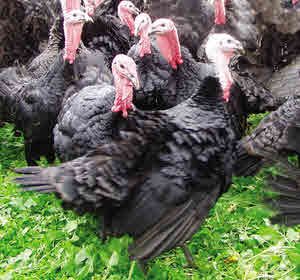 Good pasture management and rotation will go a long way to reducing the burden of turkey parasites. Good hygiene and regular cleaning routines with housing will reduce lice and mites.
Good pasture management and rotation will go a long way to reducing the burden of turkey parasites. Good hygiene and regular cleaning routines with housing will reduce lice and mites.
Poisonous Plants Affecting Turkeys
This is an unlikely occurrence but birds can be poisoned by plants or seeds while on range. There are many poisonous plants but the most common are as follows:
- Corncockle
- Foxglove
- Laburnum
- Laurel
- Milkweed
- Deadly Nightshade
- Thornapple
- Yew
It is always a good idea to have a good book on the subject of poisonous plants so that identification is simplified.
Internal Parasites Affecting Turkeys
There are several different types of worms that can affect turkeys. They can be picked up from the ground when the turkeys are out on range. Putting growing poults onto fresh ground helps but the droppings of wild birds can introduce the eggs of these internal parasites onto otherwise clean pasture.
Caecal Worms
Sometimes called hairworms these build up in the blind gut or caecum.
Gapeworms
These attach themselves to the windpipe causing the bird to stretch out its neck to help it to breathe.
Roundworms
Both large and small roundworms infest and lay their eggs in the intestines. The worms absorb nutrients from the food so consequently the turkey can develop a great appetite. If the infestation grows worse the bird will look pale and stop growing.
Tapeworms
Tapeworms attach themselves to the lining of the intestinal tract. As the worm grows sections break off and eggs are passed in the droppings. These eggs are harmless to turkeys but if they are eaten by insects such as beetles, they hatch within their host. If the insect is then eaten by a turkey, the tapeworm infestation will be transmitted
External parasites Affecting Turkeys
Lice
Lice can be seen on adult turkeys but are unlikely to be found on growing poults. They are about 2mm long and a yellow/brown colour. Lice are found on the skin particularly around the vent, and they lay eggs that adhere to the skin with a sticky substance around the base of the feathers.
Lice are a constant irritant to the birds and they can become listless and ill-tempered leading to outbreaks of fighting.
Red Mite (Dermanyssus gallinae)
These hide in house crevices during the day and feed on the birds at night. They are about 1mm long and grey in colour, although those that have sucked blood will be red. They are almost certainly introduced by wild birds. Turkeys badly bitten by mites can become anaemic and jaundiced and may begin to lose weight.
If the situation is left untreated, turkeys may begin to die. Treat the house during the daytime. Spray all cracks in the house and the underside of perches with an appropriate treatment and repeat a week later. I have also used a blowlamp when the house is empty. This is effective providing you don’t start a fire!
If the turkeys are perching on straw bales, spray these too. If the infestation does not clear up quickly, remove the straw bales and replace them with fresh ones.
Northern Mite
These are like lice in that they live entirely on their host. They are about 1mm long and grey in colour. Unlike red mite, they can be seen on the bird during the day. The symptoms are similar to birds infested with red mite. They are difficult to eradicate, so thorough and repeated treatment of each bird will be necessary.
Scaly Leg Mite(Sarcoptes mutans)
This is an annoying mite that finds its way between the leg scales. Its activities produce white crusts that push up and distort the scales, making the legs look unsightly. It is extremely infectious and where birds are affected, they need immediate treatment, while litter and any straw bales should be burned and replaced.
This article is a shortened extract from Starting with Turkeys by Katie Thear and used with permission of the publisher.
Further Articles on Keeping Turkeys
- Breeding Turkeys – Genetics & Stock
- Breeding Turkeys – Incubating & Hatching Turkey Eggs
- Breeding Turkeys – Introducing Sexes & Mating Turkeys
- Breeding Turkeys – Turkey Rearing: Good Stock
- Guide to Keeping Turkeys – Housing & Feeding Turkeys
- Guide to Keeping Turkeys – Introduction & Turkey Breeds
- Guide to Keeping Turkeys – Turkey Diseases
- Guide to Keeping Turkeys – Turkey Health
- Guide to Keeping Turkeys – Turkey Parasites & Poison

